
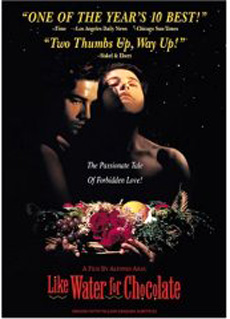
The title, “Like Water For Chocolate” means “sexually excited” in Mexican slang. You’ll see some of the sexiest cooking ever filmed, as cooking is used as a metaphor for flirting and seduction. Click here to purchase the DVD.
July 2006
Updated September 2009
|
 |
Foreign Films
A Great Food Film Needs No Subtitles
The number of movies on this list goes to show that food is a universal language, and that what and how we eat is an essential element of our cultural identity. Put your new-found multiculturalism to use by ordering in and checking out some of our favorite foreign food films. There are many other foreign films in other genre sections. Explore other genres.
Use the Contact Us link on this page to send us your favorite films or food scenes.
|
|
Babette’s Feast
In 19th century Denmark, two adult sisters live in an isolated village with their father, who is the honored pastor of a small Protestant church that is almost a sect unto itself. Although they each are presented with a real opportunity to leave the village, the sisters choose to stay with their father, to serve to him and their church. After some years, a French woman refugee, Babette, arrives at their door, begs them to take her in, and commits herself to work for them as maid/housekeeper/cook. Sometime after their father dies, the sisters decide to hold a dinner to commemorate the 100th anniversary of his birth. Babette experiences unexpected good fortune and implores the sisters to allow her to take charge of the preparation of the meal. Although they are secretly concerned about what Babette, a Catholic and a foreigner, might do, the sisters allow her to go ahead. Babette then prepares the feast of a lifetime for the members of the tiny church and an important gentleman related to one of them.—from Amazon.com
Purchase the DVD. |
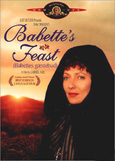 |
Cousin, Cousine
One of the first, and most successful, French export comedies, Cousin Cousine garnered a Best Actress Oscar nomination for Marie-Christine Barrault, an international audience for director Jean- Charles Tacchella, and a substantial, surprising haul at American box offices in late 1975 and early ’76. Retrospectively, it’s not difficult to understand why: Barrault and costar Victor Lanoux prove themselves to be adept, protean comic actors, and Tacchella’s breezy pacing makes the witty, gag-laden script crackle with frenetic verve. Barrault and Lanoux play cousins (by marriage only; it isn’t quite that French) drawn together when their respective partners are caught philandering. Their initial friendship quickly blossoms into something altogether more scandalous. The narrative, framed by weddings, funerals, and other family get-togethers, feels surprisingly modern in its choice of milieu; indeed, recent comedies such as Four Weddings and a Funeral and My Best Friend’s Wedding owe a substantial debt to the whimsical tone of Cousin Cousine. More Hollywood than Cannes, it’s perhaps unsurprising that Tacchella’s comedy was recently remade into Cousins (1989), an intermittently amusing Ted Danson vehicle with occasional resemblances to its vastly superior predecessor.—Miles Bethany, from Amazon.com
Purchase the VHS tape. |
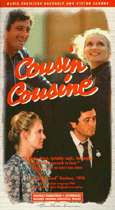 |
La Cuisine au Beurre (Cooking With Butter)
In this comedy, a French prisoner of war (WWII) returns home to his wife and café after a decade to find her with another man—a chef who cooks with butter, while the he cooks with oil. Which man, and which fat, will win her heart?—Melissa Hom, TheNibble.com |
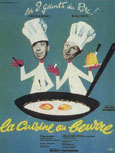 |
Cuisine Americaine
French-born, UCLA-trained screenwriter Jean-Yves Pitoun made his directorial debut with this French comedy in which self-taught cook Lorenzo, aka Loren (Jason Lee) is discharged from the U.S. Navy after hitting a superior who accused him of serving “sissy food” to the Admiral’s guests. Back in Brooklyn, Loren works at his Italian-Irish family’s pizza parlor and then heads for France to study with his idol, chef Louis Boyer (Eddy Mitchell). After the death of his wife, Boyer raised his daughter Gabrielle (Irene Jacob), now a successful restaurant architect engaged to physician Vincent (Thibault de Montalembert). Gabrielle and Loren compare recipes and finally choose romance from their menu, while Boyer begins to cave in from the stress of tax problems, restaurant critics, and police seeking illegal foreign workers.—from Amazon.com |
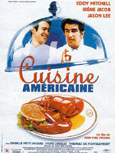 |
Delicatessen
A post-apocalyptic future becomes the setting for pitch black humor in this visually intricate French comedy. The action takes place within a single apartment complex, which is owned by the same man that operates the downstairs butcher shop. It’s a particularly popular place to live, thanks to the butcher’s uncanny ability to find excellent cuts of meat despite the horrible living conditions outside. The newest building superintendent, a former circus clown, thinks he has found an ideal living situation. All that changes, however, when he discovers the true source of the butcher’s meat, and that he may be the next main course. This dark tale is played out in a brilliantly designed, glorious surreal alternate world reminiscent of the works of director Terry Gilliam, who co-presented the film’s American release. Like Gilliam, co-directors Jean-Pierre Jeunet and Marc Caro hail from an animation background, and have a fondness for extravagant visuals, absurdist plot twists, and a sense of humor that combines sharp satire with broad slapstick and gross-out imagery. This mixture may displease the weak of stomach, but those attuned to the film’s sensibility will be delighted by the obvious technical virtuosity and wicked sense of humor.—from Amazon.com
|
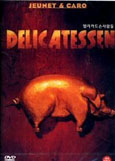 |
The Discreet Charm of the Bourgeosie
What can be more enjoyable then a meal among friends and family? In Luis Buñuel’s surrealistic comedy The Discreet Charm Of The Bourgeoisie it is this common ritual a sextet of upper-class friends repeatedly attempt, only to be obstructed by one obscure event after another. Masterfully balancing the dichotomy of class vs. debauchery Buñuel delivers a ripping critique of the upper class. It is clear from the beginning that the lives Buñuel’s Bourgeoisie are living are not what they seem. Eventually, their true colors begin to shine; not in actual actions but in haunting dreams. What is real and what lies in the subconscious becoming exceedingly blurry and in order to deliver his message, surrealism must take over. It is hard to pigeonhole Buñuel’s classic that won him the Oscar for Best Foreign Language Film 1972: An absurd odyssey? A discreet satire? Not necessarily, but definitely charming.—Rob Bracco, from Amazon.com
Purchase the DVD. |
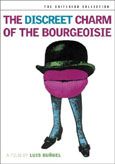 |
Eat A Bowl Of Tea
Director Wayne Wang is in his appealingly low-key groove with this wry comedy-drama, a precursor to his later success with The Joy Luck Club. It’s set in the aftermath of World War II, when the restrictive U.S. immigration laws had finally been relaxed. WWII vet Russell Wong is a young Chinese-American hepcat, strong-armed by his dad (the wonderfully gnarled character actor Victor Wong) into an arranged marriage with a Chinese girl (Cora Miao). The trip to China, and the atmosphere of New York’s Chinatown, are neatly mounted. The film’s central joke, and metaphor, is the bridegroom’s impotence after marriage; he’s cowed by the expectations of his traditional culture, which don’t necessarily match his own ideas. In its quiet way, Eat a Bowl of Tea examines the larger issues of ethnic identity while poking affectionate fun at its floundering characters—a distinctly modern attitude for a 1940s story.—Robert Horton, from Amazon.com
Purchase the DVD. |
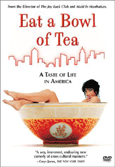 |
Eat Drink Man Woman
This is not a movie to see on an empty stomach. Writer-director Ang Lee’s 1994 Oscar nominee tells a family story about a chef and his three daughters through the meals the chef prepares and serves his family. This touching, dryly funny story of a family coping with personal lives and the way those lives intersect with the family relationships captures a shift in generations in Taipei. The father, a famous chef who has lost his taste buds, still cooks, though he draws no pleasure from eating. His daughters, meanwhile, deal with both the disappointments and surprises of daily living and the way their adult lives compare to the expectations the widowed father had for them. A subtle, amusing—and mouth-watering—comedy of impeccable manners.—Marshall Fine for Amazon.com
Purchase the DVD. |
 |
Ermo
A humble and remote Chinese noodle street vendor cares for her disabled husband and son. When a neighbor buys a television, Ermo’s drive for consumerism awakens and she refuses to be outdone. As she heads toward the city to make more money, but ends up selling—and losing—more than she expected, all for a television set.—Melissa Hom
Purchase the VHS tape. |
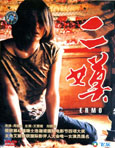 |
Fallen Angels
Fallen Angels was originally planned as one section of director Wong Kar-Wai’s best-known film, Chungking Express, but eventually it grew into its own distinct and delirious shape. In many ways, Fallen Angels may be the better film, a dark, frantic fun-house ride through Hong Kong’s nighttime world. Part of the film is a love story between two people who have barely met: a young, ultra-hip hit man (Leon Lai) and the dreamy operative (Michele Reis) who plans his jobs. Much of the movie is given over to a very strange subplot about a manic mute (Takeshi Kaneshiro) who goes on bizarre nocturnal prowls through a closed food market—like almost everything else in Wong’s films, this is antic, stylish, and oddly touching, all at the same time. It must be said that, also like Wong’s other films, Fallen Angels is fragmented and oblique to the point of occasional incomprehensibility…but then suddenly something wild or wonderful happens, such as the moment when the killer leaves the scene of a spectacular shooting and is promptly waylaid by a cheerful old school chum on a public bus. These coups—whether lyrical, violent, or simply “how on earth did they get that shot?”—are tossed off by Wong and cinematographer Christopher Doyle with all the cool of the hired killer, as though the movie were a cigarette dangling from a pair of oh-so-casual lips. This is exactly why so many otherwise calm critics fell all over themselves in hailing Wong Kar-Wai as one of the most exciting filmmakers of his generation.—Robert Horton, from Amazon.com
Purchase the DVD. |
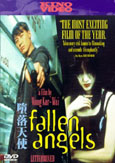 |
A Feast At Midnight
A British comedy about a social outcast who forms a secret society for cooking and feasting at midnight at his school.—Melissa Hom, TheNibble.com
Purchase the DVD. |
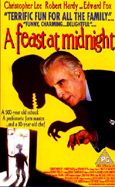 |
The God Of Cookery
A conceited chef is defaced when an underhanded rival takes over his cooking empire. Fortunately, he meets a sweet and kind-hearted street vendor who has healing abilities. The two decide to reclaim their cooking status with a cook-off.—Melissa Hom, TheNibble.com
Purchase the DVD. |
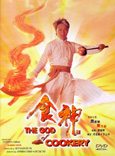 |
Jamón, Jamón
Class, sex, and food are the obsessions of this Spanish comedy drama, an international hit from writer and director J.J. Bigas Luna that plays like a cross between the lusty Like Water for Chocolate (1992) and the early work of Pedro Almodovar. In a small town in Spain’s arid Monegros region, young underwear factory executive Jose Luis (Jordi Molla) falls in love with the beautiful Silvia (Penelope Cruz), a worker on the shop floor. When Silvia becomes pregnant, Jose Luis wants to marry her, but his mother Conchita (Stefania Sandrelli), the factory owner, is appalled by the thought of her son marrying a working-class girl, especially one who is the daughter of a prostitute, Carmen (Anna Galiena). So Conchita hatches a scheme to woo Silvia away from her son by hiring handsome model Raul (Javier Bardem) to seduce the girl. A ham factory employee with aspirations to become a bullfighter, Raul’s charms work their magic on both Silvia and Conchita, much to the dismay of Jose Luis, who seeks comfort in the arms of his sometime lover, Carmen. Jamon Jamon (1992) was the winner of a Silver Lion at the Venice Film Festival.—from Amazon.com
Purchase the DVD. |
 |
Like Water For Chocolate (Como Agua Para Chocolate)
Expect to be very hungry (and perhaps amorous) after watching this contemporary classic in the small genre of food movies that includes Babette’s Feast and Big Night. Director Alfonso Arau (A Walk in the Clouds), adapting a novel by his former wife, Laura Esquivel, tells the story of a young woman (Lumi Cavazos) who learns to suppress her passions under the eye of a stern mother, but channels them into her cooking. The result is a steady stream of cuisine so delicious as to be an almost erotic experience for those lucky enough to have a bite. The film’s quotient of magic realism feels a little stock, but the story line is good and Arau’s affinity for the sensuality of food (and of nature) is sublime. You might want to rush off to a good Mexican restaurant afterward, but that's a good thing.—Tom Keogh for Amazon.com
Purchase the DVD. |
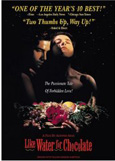 |
Meals On Wheels
A truly international production, Wheels on Meals teams up Jackie Chan, Sammo Hung, and Yuen Biao in a comedic-action-crime caper that includes what some consider one of the greatest fight scenes ever filmed. Directed by Hung, the movie takes place in Spain, marking the first Jackie Chan vehicle set in a non-Asian location. Chan and Biao play two lunch-truck restaurateurs who are trying to make a living selling egg rolls and hamburgers in the busy squares of Barcelona. Hung is a novice private investigator searching for a beautiful pickpocket named Sylvia (Lola Ferner) whose thieving teams her up with Chan and Yuen. Sylvia is kidnapped after she discovers she is actually a wealthy heiress, and that’s when Chan, Yuen, and Hung join forces to free her and kick some bad guys’ butts. Wheels on Meals is lighthearted fun with stunts and action scenes (including skateboarding tricks and a scene in which Chan and Yuen face off against a motorbike gang) that simply reaffirm the stars’ physical and comic talents. The celebrated fight scene is a matchup between Chan and international kickboxing champion Benny “the Jet” Urquidez. The intensity of their scenes together spurred rumors of a rivalry beyond the film. Whether or not this was true, the two paired up again four years later in Dragons Forever. As for the nonsensical title, one theory claims the film’s distributor (Golden Harvest) had little success with films whose titles started with “m” so they simply switched the two words around. The DVD boasts subtitles in eight different languages but does not include the “blooper” outtakes that frequently accompany Chan’s films.—Shannon Gee, from Amazon.com
Purchase the DVD. |
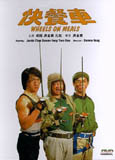 |
Satyricon
Two student friends in first century Rome under Nero’s reign divide themselves over a common love interest – only to cause a divide in the earth with an earthquake. Their finger-licking hedonistic travels lead them to adventure and encounters with the demi-divine.—Melissa Hom, TheNibble.com
Purchase the DVD. |
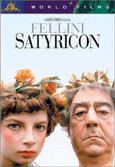 |
The Story Of Qiu Ju
In this remarkable film about a woman obsessed with exacting an apology from the chief of her small village, director Zhang Yimou (Red Sorghum, Raise the Red Lantern) tells a deceptively simple story with incredible art. When Wang Shantang (Lei Laosheng), the chief, kicks a chili farmer, Quinglai (Liu Peiqi), between the legs, all the farmer’s wife, Qiu Ju (Gong Li), wants is an apology. The chief’s reticence sends Qiu Ju on a misguided journey through the legal system in search of satisfaction. What she gets, however, is a harsh lesson in “be careful of what you ask for.” In the end she finds that life can frustrate our attempts at harmony in the simplest, cruelest ways. Among the most notable aspects of this film are the marvelous performances by Gong Li and her supporting cast. As an example of artistic storytelling, this film is as close to flawless as one is likely to find. If you haven’t yet discovered Zhang Yimou, you have a real treat in store.—James McGrath for Amazon.com
Purchase the DVD. |
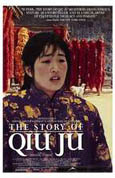 |
The Scent of the Green Papaya
“Watching it is like seeing a poem for the eyes.” That’s how Chicago Sun-Times critic Roger Ebert described this exquisite, Oscar-nominated, French-Vietnamese film from 1993, which begins in the 1950s and ends more than a decade later during the early years of the Vietnam war. The story is set almost entirely in a Saigon house where a 10-year-old orphan girl named Mui arrives to work as a servant. As she grows into a beautiful young woman, Mui is quietly and carefully observant of everything around her, from the scent of green papaya (hence the title) to the relationship between her employers. The film takes its visual cues from Mui’s observations—it’s a placid, soothing film that lingers over the physical and emotional details of its setting and story.
What’s really astonishing about this beautiful film is that director Anh Tran Hung shot it entirely on a soundstage in Paris, but the sights and sounds are so completely convincing that you’d swear the setting is an actual home in Saigon. This remarkable craftsmanship remains invisible to the viewer, and the seductive progression of the story unfolds with exacting visual precision. It’s a film about Mui’s growth and development, but also about her benevolent effect on the world around her. As such, it’s a movie to savor like no other, life affirming and glorious in the memorable depth of its captivating simplicity.—Jeff Shannon
Purchase the DVD. |
 |
301-302
301-302 explores the mysterious disappearance of one of two young women who live across the hall from each other in a modern apartment complex in Seoul, Korea. The women, referred to by their apartment number, each share common yet dissimilar obsessions. 302 is an anorexic recluse with a pathological dislike of food. 301, a talented chef, has just moved in across the hall. 301 befriends 302 and tries to tempt her into eating with glorious cooking. There are twists, flashbacks and black humor as the histories of both women are revealed and we learn why 302 won’t eat. An Official Selection of the Sundance Film Festival and the Berlin International Film Festival.—from Amazon.com
Purchase the DVD. |
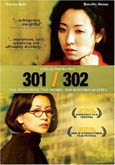
|
Spicy Love Soup
A huge hit as a refreshingly young and modern movie in Chinese cinema, the film centers on five different love relationships – each with their individual warmth and quirks, similar to Love Actually.—Melissa Hom, TheNibble.com |
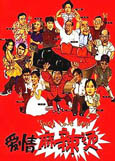 |
Tampopo
Tampopo means dandelion in Japanese, and the plot of the film is structured much like one. The center of the flower, the main storyline, is about two truckers who stop late one night to get some noodles, and meet a widowed young ramen shop proprietor named Tampopo. Her shop isn’t so great or special, especially to two noodle connoisseurs, which these truckers definitely are. But when one of the truckers gets beaten up, and Tampopo nurses him back to health, he agrees to stay and teach her everything he knows about the art of ramen.
As the truckers and Tampopo embark on an almost spiritual journey to create the ultimate noodle shop, picking up friends and self-knowledge along the way, the film wanders off in many directions. Interspersed throughout this main storyline are a series of small vignettes about food. We see some of the characters from these vignettes again, though most appear only once. The fact that these short films-within-a-film manage to stand on their own emphasizes the fact that this is a movie about more than just the characters in it. It is about the act of eating, and a reminder that by treating what may appear to be mundane with reverence, whether it is food or another person, a rewarding and previously unseen world is revealed.—Jake Lemkowitz, TheNibble.com
Purchase the VHS tape. |
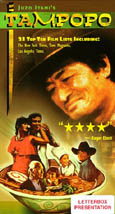 |
| |
|
.
|






















